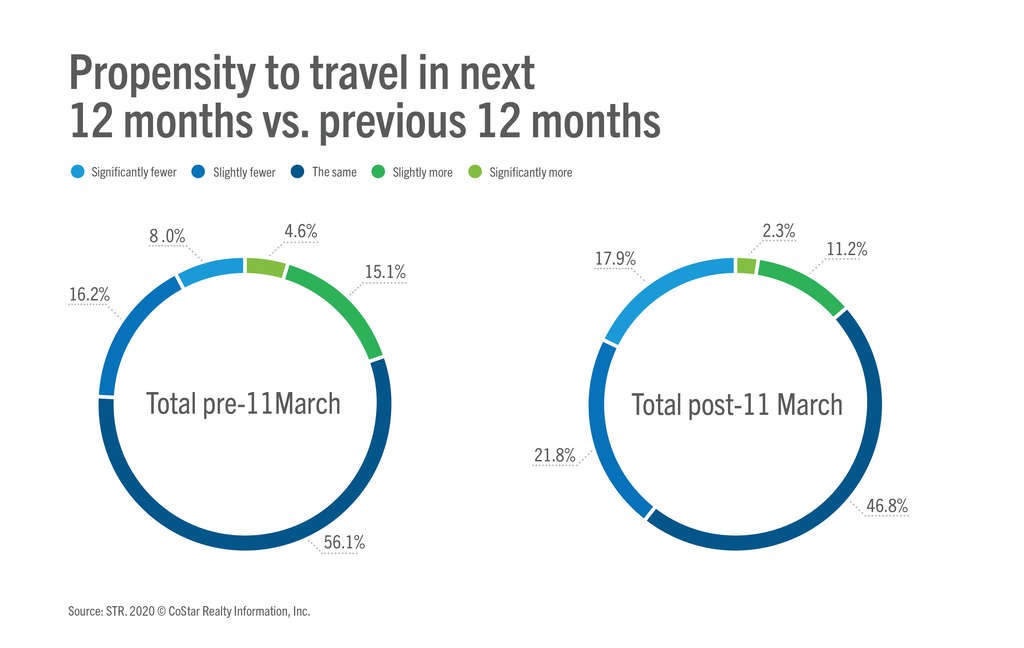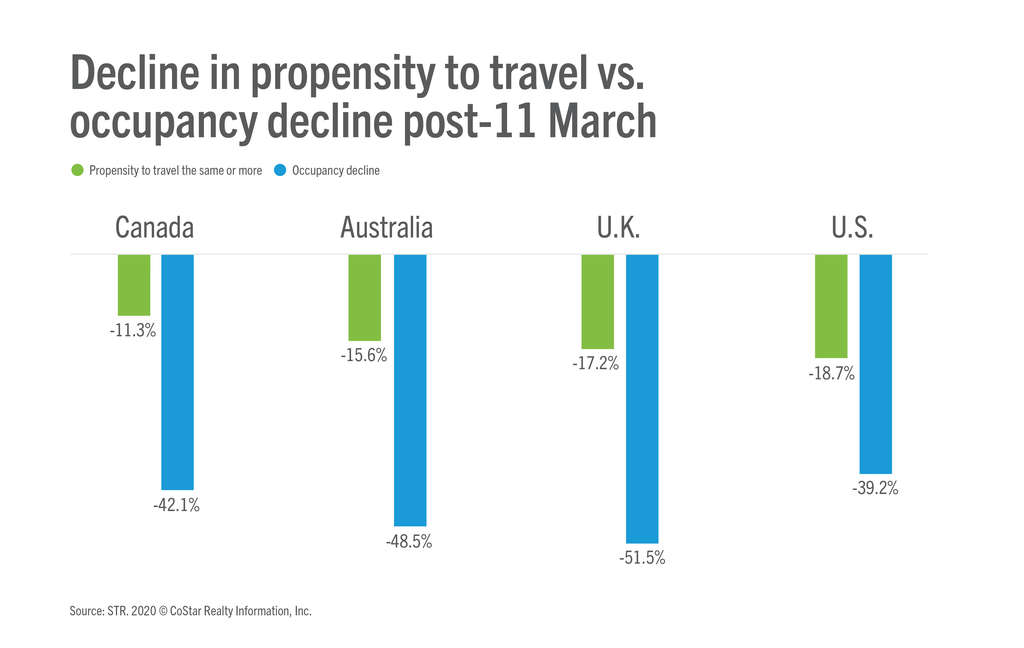How COVID-19 Has Affected Intentions to Travel and Perceptions in Key Global Markets
COVID-19's impact on consumer opinion and behavior seemed to evolve daily throughout March, especially with the World Health Organization (WHO) declaring a global pandemic on the 11th. To understand the effects on sentiment and future international travel plans, STR captured the views of travelers across 4 key markets: the U.S., Canada, U.K. and Australia.
These four English-speaking markets make up a significant portion of global tourism receipts—20% or US$338 billion. Given these countries' importance in the global travel industry—collectively, they account for some 462 million consumers—we examined March 2020 reactions to the impact of COVID-19 across these markets.
Analyzing the attitudes towards travel among these four markets before and after 11 March enables an interesting comparison of how traveler views changed during the month.
Our research, which was conducted in March 2020, surveyed a total of 2,391 respondents with an interest in travel, and was split evenly across the four markets. Some interesting findings are presented below.
Desire for travel has declined but remains strong overall
The developing severity of the COVID-19 pandemic had a notable effect on intention to travel during the second half of March. As the chart below shows, appetite for travel amongst those surveyed declined during the latter half of the month, and the percentage who answered that they would travel more declined from 20% to 13%. At the same time, those who stated they would travel less increased from 24% to 40%.
However, put differently, these findings from the second half of the month show that 60% of consumers still intend to travel either the same amount or more in the next 12 months, in comparison to the past 12 months. This is yet another reminder of travel's desirability as a leisure activity.
Canada maintains a more positive outlook
Of the markets surveyed, Canada's proportion of visitors with a desire to travel more after 11 March is noticeably higher than the overall average (18% versus the 13% average). This could be a reflection of the less severe COVID-19 impact witnessed in Canada to date.
Comparing propensity to travel across the four markets before and after the WHO classification shows that Canadians were also least impacted by the announcement. Canada's decline in propensity to travel the same amount or more was 11%, compared to 16% among Australians, 17% for Britons and 19% with Americans.
However, it is unsurprising that responses vary across countries before and after the classification, given each has had different experiences in terms of the spread of the virus and intervention methods used.
Canada's lockdown commenced on 16 March, and there is evidence that the country's previous experience with SARS in 2003 has been beneficial in informing its approach. Meanwhile, in the U.K., measures akin to an 'effective lockdown' were introduced on 24 March, with the government advising against all but essential travel and enforcing work-from-home measures.
A state-driven approach has evolved in the U.S. with California the first to enter lockdown on 19 March. As of 28 March, 26 of the 51 states were encouraging people to stay at home. Australia was the last of these markets to put restrictions in place, with a full lockdown happening on 31 March.
The different paths countries have taken to tackle the virus have influenced the attitude of the population and helps to explain the variances in opinion.
While hotel demand fell by 40%-50% in these key markets during the second half of March, the desire to travel the same amount or more has only fallen by 10-20%—reaffirming that as long as they can, consumers will always want to travel.
Interestingly, those who say they intend to travel more in the next 12 months are more likely to be younger. 20% of those aged 16-34 said they would like to travel more, which was above the overall average of 13%. Conversely, and perhaps unsurprisingly, those aged 55 or above were much less likely to travel more (8%).
Could COVID-19 present an opportunity for innovation?
Airbnb was founded in late-2008 after the financial crisis. So, the question now is where those new opportunities will arise when the world exits lockdown? Additional analysis of traveler data shows that travelers with a preference for luxury accommodation may be less impacted by COVID-19. In our next blog post, we will explore this further through analysis of consumer usage and attitude towards different types of accommodation, as well as a review of how that might influence recovery patterns.
Find STR's full list of Consumer Research products here. For further insights into the impact of COVID-19 on hotel performance, visit our content hub.
About STR
STR provides premium data benchmarking, analytics and marketplace insights for the global hospitality industry. Founded in 1985, STR maintains a presence in 15 countries with a corporate North American headquarters in Hendersonville, Tennessee, an international headquarters in London, and an Asia Pacific headquarters in Singapore. STR was acquired in October 2019 by CoStar Group, Inc. (NASDAQ: CSGP), the leading provider of commercial real estate information, analytics and online marketplaces. For more information, please visit str.com and costargroup.com.








